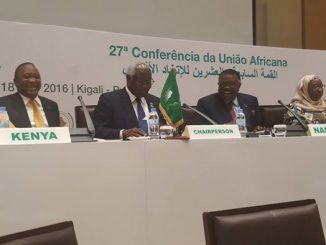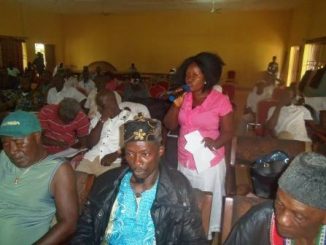
By KABS KANU
Whenever a government minister or ambassador travels, he gets U.S $500 a day as per diem . When the president and his wife travel, they each collect about $1,000 as DSA per day. Could these per diems not have been slashed to arrest government financial shortfalls , rather than impose a 5% tax on rice and fuel, of all commodities , and iron rods ? Why should the poor people always bear the brunt of this Government’s profligacy?
These are some of the questions that people in Sierra Leone have been asking since President Maada Bio’s Sierra Leone People’s Party ( SLPP) Government imposed a 5% tax on the nation’s staple food, rice.
What could be more callous and insensitive to our already suffering people ? To impose taxes on rice, our staple food, fuel and iron rods ? At a time like this when prices of food and other basic commodities are already out of control in the country ?
The SLPP government is fully aware of the cascading effects of a very steep rise in the price of fuel, especially . Fuel prices control other market forces. When fuel price increases, it leads to a corresponding increase in the prices of other consumer goods. To impose such a tax on fuel is equivalent to giving hemlock to an already starving man.
BIO IS CRUEL AND INSENSITIVE TO THE PEOPLE’S SUFFERING
The SLPP Government is cash-starved. President Bio’s stubborn-headedness and impetuosity in stealing the elections have antagonized donor partners against his government and himself and money is not coming in as it used to do. Even the IMF-approved loan of U.S $20 million is meager to handle all the economic and related problems this government has created. Therefore, as at now, the SLPP Government cannot pay salaries and wages on time and public sector workers are starving off cash to feed their families and meet other obligations. The government imposed the recent 2024 Finance Bill and allied taxes to address the shortfalls in revenue.
However, only a callous government would impose such taxes on basic commodities at the time like this. The SLPP Government could have done it another way, if it was prudent and cared for the people. One of the best ways the government could have done it was by slashing the profligate spending on salaries, emoluments and privileges of its ministers, ambassadors and other privileges. Even with all these challenges in cash flow, Maada Bio keeps appointing people and most of these appointments are redundant, needless and repetitive. The government could have also merged ministries and reduced the number of ministers. Instead of these measures, Bio chose to overburden the people more. Why is it the poor who should always bear the brunt of this government’s economic ineptitude and shambles?
Bio now has the gumption and callousness to impose 5% taxes on the national staple, rice and gas, which will soon see Sierra Leone buying a bag of rice one million leones when the standard wage in Sierra Leone is Le 500,00 for senior civil servants while ordinary citizens hardly receive 100,000 a month . How does Bio expect our people to eat, pay their rents and other utilities and send their children to school
I have been saying that when I worked on the UN Peacebuilding Sierra Leone Specific Configuration, we engaged the government on all the factors that could cause slippages in peace building and its consolidation and lead the country back to conflict. One of these factors was the insensitivity of the government to the sufferings of the people. The Bio government is not under these constraints like the Ernest Koroma Government . That is why he does what he pleases.
From the diplomatic point of view, the challenges facing peacebuilding and consolidation in Sierra Leone are corruption, callous insensitivity to the suffering of the people, impunity, improper natural resource management, lack of access to basic social services, youth unemployment, poor fiscal policies, injustice, elections rigging, political intolerance and extremism, inequality, tribalism and regionalism etc. etc. All of these errors, which were also addressed by the Truth and Reconciliation Commission ( TRC) are being repeated with impunity by the Bio SLPP Government, without consideration to the consequences. This is why international stakeholders are so busy at work presently trying to help this president steer away from these mistakes. But Bio is too stubborn-headed and listens only to himself.
Imposing tax on rice is just another example of the callousness of this SLPP Government and its insensitivity to the suffering of the people.
*THE BETTS FIRM’S BRIEF OF THE FINANCE ACT 2024*
On 9th November 2024, the Finance Act 2024 was ratified by Parliament with multiple fiscal provisions to enhance revenue mobilisation.
Vital provisions in the Finance Bill 2024 are:
1. Introduction of 5% Import Duty on Rice in 2024, increasing to 10% in 2025.
2. Increase in other import duties for cement (20%), cooking gas (5%) and iron rods (10%).
3. The minimum Alternate Tax (MAT) rate is reduced from 3% to 2% and only applies to loss-making companies.
4. Income derived from digital products and services by companies such as Google, Meta and Amazon from consumers in Sierra Leone is taxable in Sierra Leone.
5. Adjustments in multiple Withholding Tax rates on Dividends, Management & Professional Fees, and Lottery Winnings to 15%
6. 1% Education Levy introduced, increasing contractors’ withholding tax rates to 6.5% (from 5.5%) for residents and 11.5% for non-residents (from 10.5%).
7. Harmonisation of Excise Duty rates for domestic and import sectors, except for beer and stout.
8. Introduction of Excise Duty on plastic products.
9. Introduction of Excise Duty of 10% for gambling, betting and lottery.
10. Stamp Duty is adjusted with multiple rates for property and other transactions.
11. Goods and Services Tax registration threshold increased from SLE 100,000 to SLE 500,000.
12. Re-introduction of GST exemption for plant and machinery for agriculture, manufacturing, mining and petroleum sectors.
13. Introduction of Duty exemption for plant and machinery for some elements of the manufacturing sector.
14. Demurrage days were adjusted from weekdays to official working days.
#TheBettsFirm #FinanceAct2024 #TaxAdvisory




